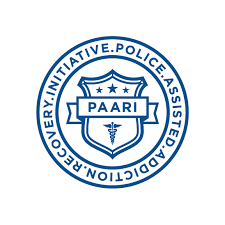A law enforcement initiative, begun in Gloucester, MA and now expanded nationwide, that aims to make police departments a point of entry for treatment, providing early intervention and treatment on demand for those with substance use disorders
This initiative builds from Gloucester’s Angel program, bringing together law enforcement to intervene in the addiction process. PAARI is a nonprofit organization whose mission is to support the Gloucester Police on their addiction initiative, to aid other police departments to implement similar programs, and to foster a dialogue around the unique opportunity for police departments to take direct action against the disease of drug addiction in their communities.
The Police Assisted Addiction & Recovery Initiative (PAARI) provides support and resources to help law enforcement agencies nationwide create non-arrest pathways to treatment and recovery. Recognizing that law enforcement has a front row seat to the opioid crisis and are in a unique position to prevent overdose deaths, in June 2015 the Gloucester Police Department launched the Angel Program, which created a simple, stigma-free entry point to treatment on demand and reframed addiction as a disease, not a crime. PAARI was founded as a nonprofit alongside the Angel Program to help law enforcement agencies create non-arrest programs that prevent and reduce overdose deaths and expand access to treatment and recovery.
Now a national network of more than 400 police departments in 32 states, PAARI primarily supports non-arrest, or early diversion, program models that reach people before they enter the criminal justice system. Programs are customized based on the community and can utilize multiple law enforcement entry points to treatment, including self-referrals to the station and risk or incident-based outreach. Cross-sector collaboration and partnerships are vital to these programs and they are often supported by clinicians, social workers, recovery coaches, and/or trained volunteers.
PAARI in Massachusetts has partnered with other organizations to distribute fentanyl test strips. Preliminary evaluation shows for every kit distributed, there was approximately 1 health or support service or referral provided. Later peer-reviewed evidence shows that twenty-one police departments and their collaborators who were part of the initiative distributed 2,556 FTS kits and reported 3,703 referrals or direct services.









